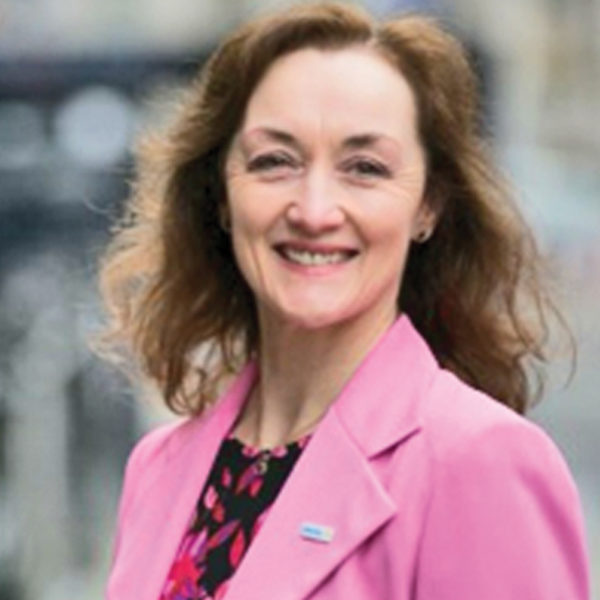
By Eoin Meegan
For over 30 years Aware has been pioneering education, support and information to people impacted by depression, bipolar disorder and other forms of mental illness throughout Ireland. This is done primarily through a variety of programmes the charity runs nationwide.
Brid O’Meara, former Director of Services at St John of God’s, and now Aware Director of Services since 2016, outlined to NewsFour some of these programmes and services.
“One of the most popular is the Life Skills Group Programme, which is based on Cognitive Behaviour Therapy (CBT) principles and has been in operation now for some years. On this course, people learn to recognise the connection between their thoughts, feelings, and actions, and by doing so are enabled to make better decisions in life.”
The course is aimed at people who are experiencing mild to moderate depression, stress or anxiety, and is delivered over six weeks in 90-minute evening sessions, with all course materials provided.
The atmosphere is relaxed and everyone is encouraged to participate, but not pressured to do so. Substantially, it has a 12-month follow-up rating, with many participants reporting significant improvement. There is also a separate online version where participants are assigned to a trained Aware supporter. This course runs for eight weeks, but participants have access to all modules and course materials for a whole year.
The Life Skills Programme for Schools “is broadly similar to the adult one, except it is specifically tailored to the needs of teenagers. It is taught to pupils between 15 and 18, and helps instill confidence and resilience, and also helps them cope with feelings of anger, and such like.”
The Wellness@Work course aims to spread awareness of mental issues in the workforce, and get people comfortable talking about their mental health. It is generally delivered during lunch breaks and includes separate Options for Employees, and Options for Line Management components.
Unlike when you fall and break your leg and everyone wants to do things for you (including sign your cast), mental illness can go unnoticed. The person doesn’t get the attention they need and therefore can feel isolated. “Mental illness can be a very silent illness.” Brid reminds us.
In addition to the above programmes, Aware provides three separate Support Services: Group, Telephone and Email Support.
The Support and Self-Care Groups is facilitated by two Aware-trained volunteers and operates on a drop-in basis. It takes place in the Aware centre (9, Upper Leeson Street) every Sunday at 12 midday. There is another one held in the Carmelite Centre, Aungier Street on Saturdays between 1.00 and 2.30, and in the Central Mission Hall, Lower Abbey Street on Monday evenings 7.15-9.00, and Tuesday lunchtime 1.00-2.30. No referral is needed, the service is free, and people can exchange ideas in a safe and supportive environment.
The Telephone Support is open from 10 am until 10 pm 365 days a year and is manned by Aware volunteers. It is designed to help people 18 years or over who are worried about depression, bipolar disorder, or their general mood, but also if they are worried about a family member.
What is involved in becoming a volunteer? I asked.
“We like people to be good listeners, and have empathy. They don’t need any previous training or qualifications as Aware provides training to prepare them for the roles. They are also required to give three hours a week of their time, and commit to 18 months; this is because Aware invests a lot in the training and they want the volunteers to stay around. All volunteers are aged 23 and up, we even have some in their 80s. They all know what it’s like to pick up the phone and make that call for the first time, so everyone is treated with sensitivity and compassion.”
The Email Support is available at all times, and volunteers try to get back to people within 24 hours, usually sooner. All emails are treated in strictest confidence.
A really innovative programme Aware run, and one that I wasn’t aware of, is the four-week Relatives and Friends Programme. This is tailored specifically for those who are supporting loved ones going through depression or bipolar disorder. A crucial component of this programme is that participants are encouraged to learn to look after their own mental health. “Just as you are instructed to put on your own oxygen mask on an airplane before attempting to help others, so it is when it comes to helping those who have mental illness,” Brid says, “if your own mental health is compromised then you are less effective in assisting others.”
The programme, which is free, is delivered in a workshop style and limited to 20 participants at a time. It attempts to address the signs and symptoms of depression and offers a lot of practical advice as well as skills and techniques on how to cope. At the end of the programme participants get to take away their own action plan.
There are now an estimated 450,000 people who suffer with depression annually in Ireland, and 45,000 with bipolar disorder. That’s a staggering figure and it looks likely to increase. The World Health Organisation predicts that by 2030 mental health will be the single biggest issue we will be coping with. We all need to keep informed, and thanks to excellent courses like these we can.
If you wish to participate in any of these programmes, or just want more information you can contact Aware at 9, Leeson Street Upper, or on 016617211. The support line is 1800 80 48 48, or supportmail@aware.ie



